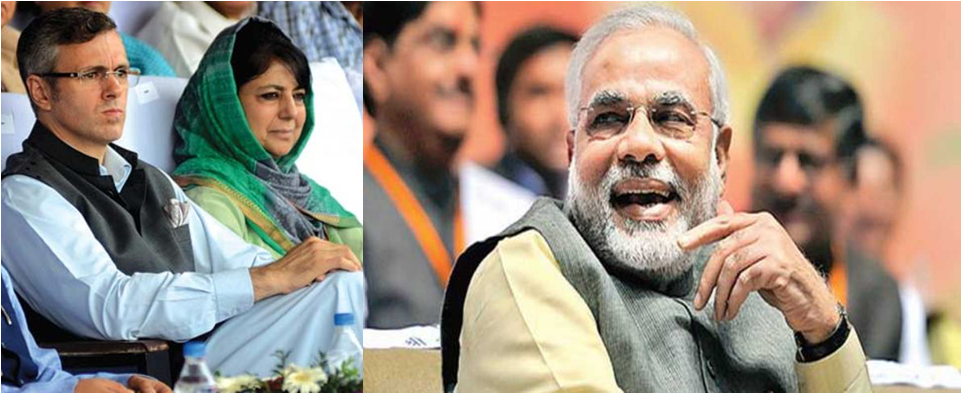India has witnessed a historic moment yesterday since after independence. 10% economically weaker sections (EWS) reservation has been implemented in the state of Jammu and Kashmir without the concurrence of J&K state assembly.
In 2018, when BJP withdrew its alliance in the state with people’s democratic party (PDP), Mehbooba Mufti resigned as the chief minister and the state assembly subsequently dissolved. Since then, the state has been under Governer Satya Pal Malik’s rule as appointed by President Ram Nath Kovind.
Jammu and Kashmir has been granted a special status in the Indian constitution since 1950. According to article 370, any law regardless of the nature of the governing list will be only made in consultation with the government of the state and that the president may modify an existing provision in the constitution for application to the said state after consultation with the government of the state.
Since the relationship of the state with the Indian union is governed by article 370 of the constitution of India, the provisions of the constitution of India with regard to the fundamental rights have been applied to the state through the constitution (application to Jammu and Kashmir) order, 1954 promulgated by the president. By this order, the existing fundamental rights of the Indian constitution were extended to the state. Thus considered, any new amendment to the fundamental rights i.e., part III of the constitution of India can be made applicable to the state only by an enabling the order promulgated by the president of India as per the 1954 constitutional order.
After the 1954 order, the constitution (seventy-seventh amendment) act, 1995 was enacted. This amended the fundamental right under article 16 of the constitution which made a provision of introducing reservation in matters of promotion to any class in the services under the State in favour of the Scheduled Castes and the Scheduled Tribes which, in the opinion of the State, are not adequately represented in the services under the State.
Since this order came after the 1954 order, it wasn’t implemented in the state of J&K.
Now recently, the constitution (one hundred and third amendment) act, 2019 was enacted which emended the fundamental rights under article 15 and 16 of the Indian constitution. It allowed for enactment of special provisions for the advancement of any economically weaker sections of citizens. This includes reservation up to 10% in educational institutions and appointments or posts.
This provision has been seen as a welcome move all over the country, specially for the economically weaker sections, and since is a parliamentary enacted amendment, has been applicable to all the states. However, in Jammu and Kashmir, central laws are not automatically applicable as it is a special status.
Finance minister Arun Jaitley on Thursday night announced that the Union Cabinet, chaired by the Prime Minister Narendra Modi has approved the proposal of Jammu &Kashmir Government regarding amendment to the Constitution (Application to Jammu & Kashmir) 0rder, 1954 by way of the Constitution (Application to Jammu & Kashmir) Amendment Order, 2019. “It will serve the purpose of application of relevant provisions of the Constitution of India, as amended through the Constitution (Seventy Seventh Amendment) Act, 1995 and Constitution (One Hundred arid third Amendment) Act, 2019 for Jammu and Kashmir, by issuing the Constitution (Application to Jammu and Kashmir) Amendment Order, 2019 by the President under clause (1) of Article 370.”, he stated. Due to this, the economically weaker sections will now get reservation in the state. Moreover, after a long wait of 24 years, the 77th Constitution Amendment of 1995 has now been applied to the State of J&K.
Over and above that, the Union Cabinet has also approved the proposal of Jammu and Kashmir Government to issue ‘The Jammu and Kashmir Reservation (Amendment) Ordinance, 2019′ by the President of India. It provides for amendments in the Jammu and Kashmir Reservation Act, 2004 to bringing persons residing in the areas adjoining International Border within the ambit of reservation at par with persons living in areas adjoining Actual Line of Control (ALoC). Earlier, the provision of 3% reservation was available only for youth living within 6 kms of LoC in J&K. Now, this provision will be applicable for people living near the international border also. This has been a long-pending demand of the population living near the international border, as they have been facing the brunt of cross border firing in J&K.
The government had sought legal opinion of the Solicitor General on whether this Ordinance will in any manner circumvent Article 35A on which a petition is pending in the Supreme Court. Sources said government decided to go ahead with this Ordinance only after it became clear that it will not lead to any tinkering with Article 35A that bars those not domiciles of J&K from buying land in the state and enjoy other benefits.
These provisions have been promulgated by the president with the concurrence of the J&K governor. Thereby, it is in accordance with the controversial sections 370 and 35A. However, in terms of impact, this sets a clear precedence to the dilution of 370 and goes on to effectively prove how state policies can be implemented, even those which had been pending since the past 24 years for the well being of Jammu and Kashmir residents without the need of a state assembly after relying on the governor’s concurrence. Thus, successfully establishing a welcome precedence. Now it is hoped that this precedence can be used to implement other citizen focused rights in the state of J&K such as the Right to Education under Article 21A of the constitution.
